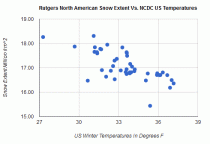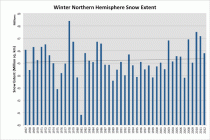By Steve Goddard
Contrary to the mindless nonsense being spewed by Jeff Masters and Joe Romm (and Heidi Cullen and her former brood at the Weather Channel), snow is associated with cold. The graph above plots Rutgers North American winter snow extent vs. NCDC US temperatures. There is a strong correlation between between cold winters and snow. During winters when a lot of cold air moves into the US, there is (of course) more snow in North America. Only a moron would suggest otherwise.
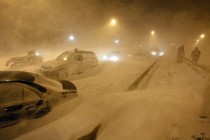
Chicago, February 2011.
The last four winters have been the snowiest four year period on record in North America - because it has been cold.
http://climate.rutgers.edu/
See more on the snow cover on WeatherBell.com.
By Marlo Lewis, Global Warming.Org
For President Obama, approving the Keystone XL Pipeline should have been a no-brainer. All the State Department had to do was conclude the obvious - the pipeline is in the U.S. national interest.

What other reasonable conclusion is possible? Building the 1,700-mile, shovel-ready project would create thousands of construction jobs, stimulate tens of billions of dollars in business spending, and generate billions of dollars in tax revenues. Once operational, the pipeline would enhance U.S. energy security, displacing oil imported from unsavory regimes with up to 830,000 barrels a day of tar sands oil from friendly, stable, environmentally fastidious, democratic Canada. Canada already ships us more oil than all Persian Gulf states combined, and Keystone would significantly expand our self-reliance on North American energy.
Obama had only two policy choices. He could either disapprove the pipeline on the grounds that environmental concerns over incremental greenhouse gas emissions and oil spill risk outweigh the substantial economic, fiscal, and energy security benefits of the pipeline. Or he could approve the pipeline on the grounds that its benefits outweigh potential environmental impacts.
He did neither. Instead, he punted a final decision until after the November 2012 elections. The timing of Obama’s decision not to decide - just days after 10,000 anti-Keystone activists formed a protest circle around the White House - strongly suggests that Obama’s waffle was politically-motivated.
If Obama approves the pipeline, he risks alienating the green wing of his political base. “Sierra Club executive director Michael Brune told reporters recently that Obama’s decision on the pipeline would ‘have a very big impact’ on how the nation’s largest environmental group funnels resources toward congressional races rather than the race for the White House,” Politico reported last week. A constant theme of protest rallies since August is that Keystone is a “litmus test” for Obama. As one green blogger put it, “if the president cannot stand with the environmental community against the pipeline, some say, why should they stand with him at all?”
If, on the other hand, Obama disapproves the pipeline, he risks alienating union labor, such as the AFL-CIO-affiliated United Association of Plumbers and Pipe Fitters. In addition, disapproval would make candidate Obama more vulnerable to GOP criticism that he cares more about green ideology than about job creation and energy security.
Former Shell Oil exec John Hofmeister nailed it: “It’s much easier to avoid a decision than to make a decision,” and delay allows Obama to dangle the hope before each group that he’ll eventually decide in their favor.
This accountability-avoidance strategy might even induce environmentalists and labor to work harder for Obama’s re-election, the implicit deal on offer being that Obama will approve or disapprove the pipeline in 2013 depending on which group delivers more campaign contributions and votes in 2012.
All the more reason, then, for friends of affordable energy to lampoon Obama’s indecision as playing politics with the nation’s economic and energy future.
----------
The right response to Obama’s Keystone XL killing
November 11, 2011 by Steve Milloy
We suggest tit-for-tat.
In response to president Obama’s decision to effectively kill the Keystone XL tar sands pipeline - as well the rest of his war against fossil fuels - House Republicans should:
Zero-out federal funding for all so-called “clean energy” projects;
Put the wind and solar guys on notice that when their production tax credit - i.e., the only reason their industries exist - expires in 2012, there won’t be any more subsidies until the war on fossil fuels stops.
Between yesterday’s Keystone XL killing and the demagogued-to-death Senate effort to roll back the EPA’s Cross-State Air Pollution rule, it should be clear that an energy war has been declared by Democrats.
Republicans need to respond in kind - that goes for the GOP presidential candidates, too.
Obama admin funds $200K poll to psych-out Republicans on climate
By Steve Milloy
A Stanford social psychologist claims his poll of 1,001 adults conducted in November 2010 shows that Republican candidates who take a “green” position on climate change gain far more votes from Democrat and Independent voters than they lose from Republican voters.
The “non-green” position included the statement that “climate science is junk science” and that “cap-and-trade is a job killer and damages our economy.”
The poll was funded by a September 2010 grant from the Obama administration’s National Science Foundation in the amount of $200,000.
Isn’t it nice that the Obama administration is trying to help Republicans get elected? Very post-partisan.
Source: CO2 Science
Global Warming: The View from China
“Global climate change,” in the words of Fang et al. (2011), “is one of the biggest challenges to human society in the 21st century.” And noting that “carbon emissions from fossil fuel combustion and land use change are considered the main factors causing global warming,” plus the fact that “carbon emissions affect social and economic development,” they correctly state that “climate change has been shifted from an academic topic to an international political, economic, and diplomatic issue.”
The five Chinese researchers - all of whom are associated with the Key Laboratory for Earth Surface Processes of the Ministry of Education at Peking University in Beijing, and two of whom are also associated with the Climate Change Research Center of the Academic Divisions of the Chinese Academy of Sciences - introduce their review of the climate change issue by noting that the Intergovenmental Panel on Climate Change (IPCC) has been the primary voice of those who support the thesis that rising atmospheric CO2 concentrations have been responsible for a worrisome increase in global temperature that is claimed to produce “a series of negative effects on natural systems, including snow and ice melt, sea-level rising, and disturbances in the hydrological cycle,” as well as “the acidification of sea water,” all of which phenomena are claimed by the IPCC to directly or indirectly threaten terrestrial and marine ecosystems and social systems.
More recently, however, Fang et al. state that the claims of the last IPCC report “have been largely questioned,” noting that “the Non-governmental International Panel on Climate Change (NIPCC), established in 2007, has introduced a number of controversial and divisive debates,” citing Singer et al. (2008) and Idso et al. (2009). They also write that “the ‘Climate-gate’ and ‘Glacier-gate’ scandals have especially questioned the public credibility of the report,” citing Hefferman (2009) and Schiemeier (2010). And as a result, they state that “the IPCC report is no longer the most authoritative document on climate changes, as it is restricted by its political tendencies and some errors and flaws.”
In their own review of the subject, Fang et al. come to the following conclusions.
First, “global warming is an objective fact,” but there is “great uncertainty in the magnitude of the temperature increase.”
Second, “both human activities and natural factors contribute to climate change, but it is difficult to quantify their relative contributions.”
Third, with regard to the IPCC claim that “the increase in atmospheric concentrations of greenhouse gases (including CO2) is the driving force for climate warming,” they note the following four problems: (1) “it remains unclear how the human and natural factors, especially the aerosols, affect the global temperature change,” (2) “over the past century, the temperature change has not always been consistent with the change of CO2 concentration,” since “for several periods, global temperatures decreased or were stable while the atmospheric CO2 concentration continuously increased,” (3) “there is no significant correlation between the annual increment of the atmospheric CO2 concentration and the annual anomaly of annual mean temperature,” and (4) “the observed significant increase of the atmospheric CO2 concentration may not be totally attributable to anthropogenic emissions because there are great uncertainties in the sources of CO2 concentration in [the] atmosphere.”
This is but one view of the subject, albeit an important one, simply because it comes from China, the world’s most populous country. Many different groups have many different ideas about the topic; and that is the nature of the long-running controversy: there is no agreement on these and other core issues. Consequently, and contrary to what the IPCC crowd continually contends, the science of global climate change is definitely not “settled.”
Sherwood, Keith and Craig Idso
References
Fang, J.Y., Zhu, J.L., Wang, S.P., Yue, C. and Shen, H.H. 2011. Global warming, human-induced carbon emissions, and their uncertainties. Science China Earth Sciences 54: 1458-1468.
Heffernan, O. 2009. Climate data spat intensifies. Nature 460: 787.
Idso, C.D. and Singer, S.F. 2009. Climate Change Reconsidered; 2009 Report of the Nongovernmental International Panel on Climate Change (NIPCC). The Heartland Institute, Chicago, Illinois, USA.
Schiermeier, Q. 2010. IPCC flooded by criticism. Nature 463: 596-597.
Singer, S.F. 2008. Nature, Not Human Activity, Rules the Climate: Summary for Policymakers of the Report of the Nongovernmental International Panel on Climate Change (NIPCC). The Heartland Institute, Chicago, Illinois, USA.
By Christopher C. Horner
The headline in today’s ClimateWire (subscription required) blares “U.N. says turning lights on for world’s poor need not boost CO2.” That is, we can provide electricity to 1.5 billion people who have never flipped a light switch and not see an increase in emissions of carbon dioxide (until the global warming fad/excuse for doing things statists like to do, this was called plant food, the driver of photosynthesis).
CO2 is released not just by oceans when they warm (absorbed when they cool) or decaying plants, or people exhaling, but combusting “fossil fuels” like the coal, gas, and, in some places, oil used to create electricity. CO2 emissions generally correlate with economic prosperity-more on that, momentarily.
But there is even less to this absurdity than meets the eye. Here’s how the ClimateWire story opens:
UNITED NATIONS - Generating enough electricity to supply the 1.5 billion people on this planet who live without it does not necessarily have to add much carbon dioxide to the global mix, U.N. experts argued in their annual Human Development Index.
The report, released yesterday, takes on the nettlesome subject of how the world can help bring these billions, most of them impoverished and living in Africa, into the light. It argues that “providing basic energy services” could happen with a CO2 increase of only 0.8 percent.
The fear that adding this level of energy supply to world accounts would mean much higher carbon output is unfounded, said William Orme, of the U.N. Development Programme, during a press briefing here on the report.
“That’s false,” he said. “You can actually do all that without creating a 1 percent rise in carbon emissions.”
Think about that. According to a UN report - coincidentally timed in the run-up to talks next month on replacing the energy-rationing Kyoto Protocol - you can create electricity for just under a quarter of the world’s population without, per the UN, even a 1% increase in man’s marginal contribution to CO2! That’s called UN Math.
The first thing that jumps out to those of us trying to find a way to make this statement be true is this interpretation: “Basic energy services” is in the eye of the beholder, a beholder who has his, viewing the dramatically lesser basic needs of others. He who seeks what others have surely has a different perspective. So far, the Kyoto disaster has affirmed this.
And then there’s this interpretation, which actually is necessary in any reading of this claim. Once the lights go on, at some level, then no growth for you! You’ve got what we think you need, now shut up.
As stated, CO2 equates with economic activity, with the statistical hiccup of certain wealthy countries depending heavily on nuclear power for much of their prosperity, like France and, until very recently, Japan and Germany.
So here again we see the newly fashionable effort to redefine prosperity, writing out economic GDP in favor of a mishmash of statist ideals leaving despotic hellholes as supposedly happy little nirvanas compared to those of us who thought reducing drudgery, disease and premature death from brutish, nasty living was somehow a good thing.
As AEI’s Steve Hayward notes, one “typical example of popular wisdom is the Happy Planet Index, which ranks the ostensible ‘happiness’ of the United States at 150th out of 178 countries, chiefly on account of America’s carbon footprint.” Mmm.
Ignore for the moment the internal confusion of this ClimateWire paragraph (surely a typo, which seems to be the principal way they get things right), and catch the argument. “Still, the U.N. report says high living standards ‘need to be carbon-fueled and follow the examples of the richest countries.’ A high degree of fossil fuel consumption was not seen as improving a nation’s life expectancy or education level, for example.”
So guess what the UN has in store for them, while also working to rope us into agreeing to Kyoto-style rationing? The UN report suggests “off-grid renewable options.” Ah, yes, the old reliable - er, wait, unreliable, “intermittent” - wind and solar power. Remember, we didn’t say often or how long the lights would be on, did we?
Just behold those happy poor...er, representatives of noble cultures. So wise, educated in ways we wealthy people will never comprehend (such are the wages of carbon sin). They’ve got a light bulb now, and they can turn them on during the day when the sun shines to power it!
So, yes, UN, you can “provide electricity” to 1.5 billion people without even slightly increasing CO2 emissions.
That is, if you don’t mind turning down, and sometimes out, the lights of many others.
And possibly squirrels running on wheels in their cages. Lots of them. And pedal-power. Hey, you need to get in shape anyway.
I mean, there are many ways this could be true. Yet, under any reading, why would we place this responsibility in the hands of, or even anywhere near, a group of people who believe in energy scarcity, not abundance? We’ve already got such a crew in charge, here, and look at the swell direction things are headed.
The ARC Centre of Excellence for Coral Reef Studies
Fish and other sea creatures will have to travel large distances to survive climate change, international marine scientists have warned.

Sea life, particularly in the Indian Ocean, the Western and Eastern Pacific and the subarctic oceans will face growing pressures to adapt or relocate to escape extinction, according to a new study by an international team of scientists published in the journal Science.
“Our research shows that species which cannot adapt to the increasingly warm waters they will encounter under climate change will have to swim farther and faster to find a new home,” says team member Professor John Pandolfi of the ARC Centre of Excellence for Coral Reef Studies and The University of Queensland.
Using 50 years’ data of global temperature changes since the 1960s, the researchers analysed the shifting climates and seasonal patterns on land and in the oceans to understand how this will affect life in both over the coming century.
“We examined the velocity of climate change (the geographic shifts of temperature bands over time) and the shift in seasonal temperatures for both land and sea. We found both measures were higher for the ocean at certain latitudes than on land, despite the fact that the oceans tend to warm more slowly than air over the land.”
The finding has serious implications especially for marine biodiversity hotspots - such as the famous Coral Triangle and reefs that flourish in equatorial seas, and for life in polar seas, which will come under rising pressure from other species moving in, the team says.
“Unlike land-dwelling animals, which can just move up a mountain to find a cooler place to live, a sea creature may have to migrate several hundred kilometres to find a new home where the water temperature, seasonal conditions and food supply all suit it,” Prof. Pandolfi says.
Under current global warming, land animals and plants are migrating polewards at a rate of about 6 kilometres a decade - but sea creatures may have to move several times faster to keep in touch with the water temperature and conditions that best suit them. Team member Associate Professor Anthony Richardson from the School of Mathematics and Physics at the University of Queensland became interested in how species might respond to climate change during his work on a global synthesis of marine climate impacts.
He says, “We have been underestimating the likely impact of climate change on the oceans.” As a general rule, it seems sea life will have to move a lot faster and farther to keep up with temperature shifts in the oceans. This applies especially to fish and marine animals living in the equatorial and subarctic seas, and poses a particular issue both for conservation and fisheries management.
Assoc. Professor Richardson explains, “There is also a complex mosaic of responses globally, related to local warming and cooling. For example, our analysis suggests that life in many areas in the Southern Ocean could move northward.” However, as a rule, they are likely to be as great or greater in the sea than on land, as a result of its more uniform temperature distribution.
The migration is likely to be particularly pronounced among marine species living at or near the sea surface, or subsisting on marine plants and plankton that require sunlight – and less so in the deep oceans.
“Also, as seas around the equator warm more quickly and sea life migrates away - north or south - in search of cooler water, it isn’t clear what, if anything, will replace it,” Prof Pandolfi adds.
“No communities of organisms from even warmer regions currently exist to replace those moving out.”
ICECAP NOTE: This is all model and theory and not data based. Here is the equatorial ocean temperatures down to 300m in the Pacific. There is no warming since 1979.
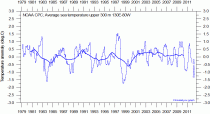
At the same time, sea life living close to the poles could find itself overwhelmed by marine migrants moving in from warmer regions, in search of cool water.
The team’s future research will focus on how different ocean species respond to climate change and they are compiling a database on this for the Intergovernmental Panel on Climate Change (IPCC).
By Steve Goddard, Real Science

Stefan Rahmstorf, Professor of Physics at Potsdam University, pointed out that for the second time in four years the ice cover at the Arctic in September had been reduced to 4.4 million square kilometres, 40 per cent less than it had been three or four decades earlier. In 2007 the reduction had been explained by odd wind patterns. There had been no odd winds this summer. The ice was also rapidly becoming thinner. There was now a prospect of an ice-free Arctic in summer, decades earlier than had once been believed remotely possible. Not only would several species in the area be in danger. The loss of the reflective mirror at the Arctic would further increase temperature in the northern regions. Already the pace of the Greenland ice shelf melt was becoming unnerving. If it was to melt entirely sometime in the future, ocean levels would rise by seven meters.
http://www.abc.net.au/unleashed/3611206.html
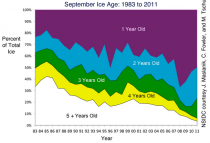
Enlarged
Meanwhile, back outside the rabbit hole, NSIDC shows a 50% increase in the extent of thick multi-year ice since 2008, and all satellites show a sharp drop in sea level over the last two years. As far as the “reflective mirror” goes, there is almost no sunshine in the Arctic in September, and the received sunshine is at a very oblique angle. September-March Arctic ice cover has almost zero impact on the earth’s SW radiative balance.
Ethics Alarm
At issue is not whether global warming is occurring, or even whether it is man-made. The issue is how incompetent, biased and astoundingly uncritical the media coverage of the issue has been and continues to be. Now major news publications and respected columnists are participating in yet another global warming ethics train wreck, which helps nobody and nothing.
Here’s is Prof. Richard Muller, a Berkeley physicist, toward the conclusion of his 2003 paper on global warming data:
“Let me be clear. My own reading of the literature and study of paleoclimate suggests strongly that carbon dioxide from burning of fossil fuels will prove to be the greatest pollutant of human history. It is likely to have severe and detrimental effects on global climate.”
Now here is the Washington Post’s Brad Plumer, on a recent Wall Street Journal op-ed by Muller announcing the results of his research:
“Back in 2010, Richard Muller, a Berkeley physicist and self-proclaimed climate skeptic, decided to launch the Berkeley Earth Surface Temperature (BEST) project to review the temperature data that underpinned global-warming claims. ...So what are the end results? ...As the team’s two-page summary flatly concludes, “Global warming is real.”
Note that the reason Plumer believes Muller’s study is worthy of special notice, and is elevated to a level of presumed objectivity and credibility, is that he is, Plumer says, a “self-proclaimed skeptic.” Does his 2003 statement sound skeptical to you? Did it seem skeptical to Plumer, or any of the many, many media sources that took his lead- “Climate-change skeptic: ‘You should not be a skeptic.’(Atlanta Constitution-Journal); ‘Climate Skeptic Sponsors New Climate Study, Confirms ‘Global Warming Is Real’ (Popular Science); ‘Skeptic Talking Point Melts Away as an Inconvenient Physicist Confirms Warming’ (New York Times); and many more?
It didn’t seem un-skeptical, because Plumer and the other reporters didn’t read it, so eager are they to show common cause with environmentalist....you know, the good guys. The non-conservatives. Either that, or they did read it, and decided to withhold it from their readers, so their readers couldn’t make up their own minds whether Muller was really a skeptic, or just a canny self-promoter who knows how to move his research to the front of the line. OR perhaps they read it and can’t understand English. Those are really our only options regarding Plumer and the rest of the journalists who aped the “skeptic” misrepresentation. They are:
a) lazy and biased
b) dishonest and biased
c) stupid, or
d) All of the above
They also didn’t read the interview Muller did on the website Grist in 2008, in which he said things like:
“The bottom line is that there is a consensus - the [Intergovernmental Panel on Climate Change] - and the president needs to know what the IPCC says. Second, they say that most of the warming of the last 50 years is probably due to humans. You need to know that this is from carbon dioxide, and you need to understand which technologies can reduce this and which can’t. Roughly 1 degree Fahrenheit of global warming has taken place; we’re responsible for one quarter of it. If we cut back so we don’t cause any more, global warming will be delayed by three years and keep on going up...” Back in the early ‘80s, I resigned from the Sierra Club over the issue of global warming. At that time, they were opposing nuclear power. What I wrote them in my letter of resignation was that, if you oppose nuclear power, the U.S. will become much more heavily dependent on fossil fuels, and that this is a pollutant to the atmosphere that is very likely to lead to global warming.”
Does that sound like a skeptic to you? As for Plumer, I repeat: lazy, dishonest, or stupid. Take your pick.
In assessing Eugene Robinson, the Washington Post’s official Obama flack columnist who once won a Pulitzer Prize somehow, I vote for “all of the above.” Three days after blogger Don Surber posted the Grist interview, Robinson offered a column (today) that proclaimed the global warming debate over because a “skeptic” had completed a study that proved “global warming is real.”
Do they have Google over at the Post, Brad? Eugene? Just wondering.
If the journalists who jumped up and down in joy over Muller’s study had bothered to do minimal research - seventh grade level, really - they would have discovered that Muller’s research project BEST has long been viewed among climate change skeptics as a set-up for exactly this. You can read Climate Depot’s extensively documented criticism of Muller in April of this year here. That’s April, Eugene. This is October.
Even this is not the worst of this spectacular display of incompetent reporting. The majority of rational climate change skeptics do not question that the earth’s temperature has been rising, but that the rise has been sufficiently linked to man-made causes, that scientists have the data to accurately predict whether the rise will continue, and that proposed measures to combat it will have the desired effect, or are necessary at all. And what did Muller’s study show on these issues? Oh, just nothing:
“Muller is claiming in a October 21, 2011 OPED that skeptics of man-made global warming fears no longer have any basis to doubt “global warming” because his new study confirms that the Earth has warmed since the 1950s! Muller seems to imply that the terms “global warming” and man-made global warming are interchangeable and any warming is somehow “proof” of human causation.” [Climate Depot]
That’s still good enough for news media climate change flacks, 99.9% of whom couldn’t decipher any of the data if their lives depended on it (and neither could I) but who just know that the global warming advocates are correct. And what about the critical “man-made” part of the equation?
If you say so, Eugene.
By Swaminathan S. Anklesaria Aiyar
The latest Nobel Prize for chemistry has confirmed what science students are taught early on: that all scientific theories are intrinsically uncertain; that science progresses through skepticism and attacks on existing theories, and that successful attacks are sometimes rewarded with Nobel Prizes. It follows that skepticism about global warming, far from being antiscience, is in keeping with the standard scientific approach - and could one day fetch a skeptic a Nobel Prize.
The Nobel for chemistry was awarded to the Israeli scientist Daniel Shechtman for his discovery of “quasicrystals,” which violate standard theories about crystals. Scientists had believed that all crystals form in repeated periodic patterns, and commercial production of crystals was based on that understanding. But Shechtman exploded the conventional wisdom by discovering quasicrystals, which form regular patterns that never repeat.
When Schechtman first announced his discovery, his superiors were scornful, telling him he should review his basic chemistry textbooks. When he persisted, he was asked to leave his research group. His first paper on the topic was rejected by the Journal of Applied Physics. But Schechtman persevered, and he proved that what 99.9 percent of scientists believed was wrong.
Sound familiar? We keep hearing that 95 percent or 98 percent of scientists believe catastrophic, man-made global warming is proven. Climate skeptics are widely denounced as science deniers. However, as Schechtman showed, 99 percent of scientists can be and have been wrong.
Science proves nothing beyond all doubt. Rather, it progresses by knocking down existing theories in favor of better ones, which in turn are subject to fresh attacks. Skepticism is at the very heart of the scientific method. The scientific approach is at odds not with climate-change skeptics, but with those who claim global warming is completely proven, contestable only by madmen and blackguards paid by oil companies.
A recent experiment at the CERN laboratory in Switzerland is casting doubt on another idea believed by about 100 percent of scientists: Einstein’s theory of relativity. CERN scientists have found particles called neutrinos that seemed to have traveled faster than light, challenging a fundamental plank of modern science. According to the theory of relativity, a particle traveling faster than light will go backward in time.
Environmentalists denounce climate skeptics as science deniers. But have the CERN scientists been denounced as Einstein deniers? No. The scientific community is shocked by the discovery but keeping an open mind - even about something as firmly established as the theory of relativity.
To say 95 percent of scientists believe in global warming suggests, incorrectly, that the skeptics are loonies. In fact, they have included Nobel laureates such as Ivar Giaever, Robert B. Laughlin, and Norman Borlaug. Giaever recently resigned from the American Physical Society in protest against its insistence that global warming is “incontrovertible.” He declared, “The claim ... is that the [global average] temperature changed from 288.0 to 288.8 degrees Kelvin in 150 years, which (if true) means to me . . . that the temperature has been amazingly stable.”
The most scientists know about the climate is not much. They know so little that they can’t predict the next drought or El Niño. When they try to predict temperatures a century hence, it’s a real stretch.
When people know only a little about a topic, they tend to make a lot of the little they know. The little in this case is that rising concentrations of greenhouse gases will raise temperatures if other things remain constant. But other things are not constant; they vary in ways we do not fully understand.
That’s why we cannot say why temperatures were high in the medieval period despite low carbon dioxide concentrations. It’s also why the U.N. Intergovernmental Panel on Climate Change does not make a definite prediction of future temperatures, instead positing six scenarios ranging from benign to catastrophic.
We know so little about the climate that we can’t rule out the possibility of a catastrophe. So we can discuss how much insurance we should buy to cover a disaster that may never happen. But that’s different from planning for certain disaster.
Answering the insurance question requires massive funding of research not just by proponents of global warming, but also by skeptics - the breed that has repeatedly won Nobel Prizes for overthrowing the existing orthodoxy.
Swaminathan S. Anklesaria Aiyar is a research fellow at the Cato Institute’s Center for Global Liberty and Prosperity and a columnist for the Times of India.



